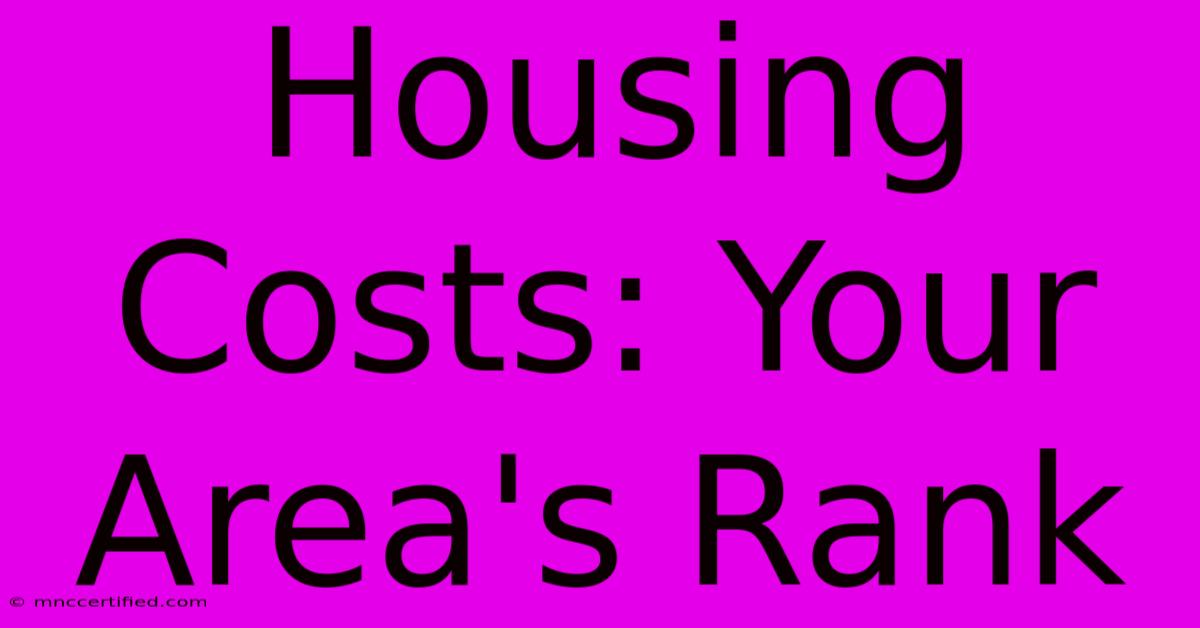Housing Costs: Your Area's Rank

Table of Contents
Housing Costs: Your Area's Rank – Understanding the National Picture and Local Impacts
Finding affordable housing is a major concern for many Americans. Understanding your area's rank in terms of housing costs is crucial for budgeting, financial planning, and making informed decisions about where to live. This article will delve into the factors influencing housing costs, how to find your area's ranking, and strategies for navigating the market effectively.
Understanding Housing Cost Rankings
Numerous organizations and websites track housing costs across the United States. These rankings usually consider factors like:
- Median Home Prices: The midpoint of all home sale prices in a given area. This offers a snapshot of the typical cost for purchasing a home.
- Median Rent Prices: The middle point of rental costs for a specific area, providing insight into typical rental expenses.
- Housing Affordability Index: This combines median home prices and incomes to gauge how easily residents can afford housing. A lower index signifies lower affordability.
- Property Taxes: These vary significantly by location and significantly impact the overall cost of homeownership.
- Homeowner's Insurance: Insurance costs are another crucial element, adding to the financial burden of owning a home.
Different organizations might use slightly different methodologies, leading to minor variations in rankings. However, the general trends and relative positions of different areas usually remain consistent.
Key Factors Influencing Housing Costs
Several factors contribute to the variation in housing costs across the country:
- Location: Proximity to major cities, job markets, and desirable amenities significantly impacts housing prices. Coastal areas and regions with strong economies tend to have higher costs.
- Supply and Demand: Limited housing inventory in a high-demand area inevitably drives prices up. Conversely, areas with abundant housing options may have lower costs.
- Economic Conditions: Strong local economies generally correlate with higher housing costs due to increased demand and higher incomes.
- Interest Rates: Mortgage interest rates directly affect affordability. Lower rates make homes more accessible, while higher rates can decrease purchasing power.
- Local Regulations and Taxes: Zoning laws, building codes, and property taxes all influence housing costs and availability.
Finding Your Area's Housing Cost Rank
Several resources can help you determine your area's rank regarding housing costs:
- Zillow: This popular real estate website provides comprehensive data on home values, rent prices, and market trends for numerous locations. You can easily search for your specific area and compare it to others.
- Realtor.com: Similar to Zillow, Realtor.com offers detailed housing market data, including median prices and affordability indices.
- U.S. Census Bureau: The Census Bureau publishes extensive data on housing, income, and other socioeconomic factors, providing a valuable resource for in-depth analysis.
- National Association of Realtors (NAR): The NAR provides reports and analyses on the national and local housing markets.
- Local Real Estate Agents: Your local real estate agent can provide valuable insights into the specific housing market conditions in your area, offering a more personalized perspective than national averages.
Navigating High Housing Costs
If your area ranks high in housing costs, consider these strategies:
- Explore Less Expensive Areas: Look at surrounding areas or less densely populated regions that might offer more affordable housing options while still providing access to employment and amenities.
- Consider Different Housing Types: Condos, townhouses, and smaller homes can often be more affordable than larger single-family houses.
- Improve Your Financial Situation: Increasing your income or reducing debt can significantly improve your purchasing power.
- Rent vs. Buy: Carefully weigh the pros and cons of renting versus buying, considering your financial situation and long-term goals.
- Seek Government Assistance: Explore potential government assistance programs that may offer financial aid for housing.
Conclusion: Making Informed Decisions
Understanding your area's housing cost ranking is a crucial first step in making informed decisions about housing. By utilizing the resources outlined above and considering the factors discussed, you can better navigate the housing market and find options that align with your financial capabilities and lifestyle preferences. Remember that consistently monitoring market trends is key to staying informed and making strategic decisions.

Thank you for visiting our website wich cover about Housing Costs: Your Area's Rank. We hope the information provided has been useful to you. Feel free to contact us if you have any questions or need further assistance. See you next time and dont miss to bookmark.
Featured Posts
-
Monaco Game Jorginho Out Of Arsenal Xi
Dec 12, 2024
-
Adem And Paralympics Lodi Teens Journey
Dec 12, 2024
-
November Crude Oil Imports Indias Four Month High
Dec 12, 2024
-
Latest Corbin Burnes News And Updates
Dec 12, 2024
-
Rangers V Tottenham Europa League Tv Channel
Dec 12, 2024